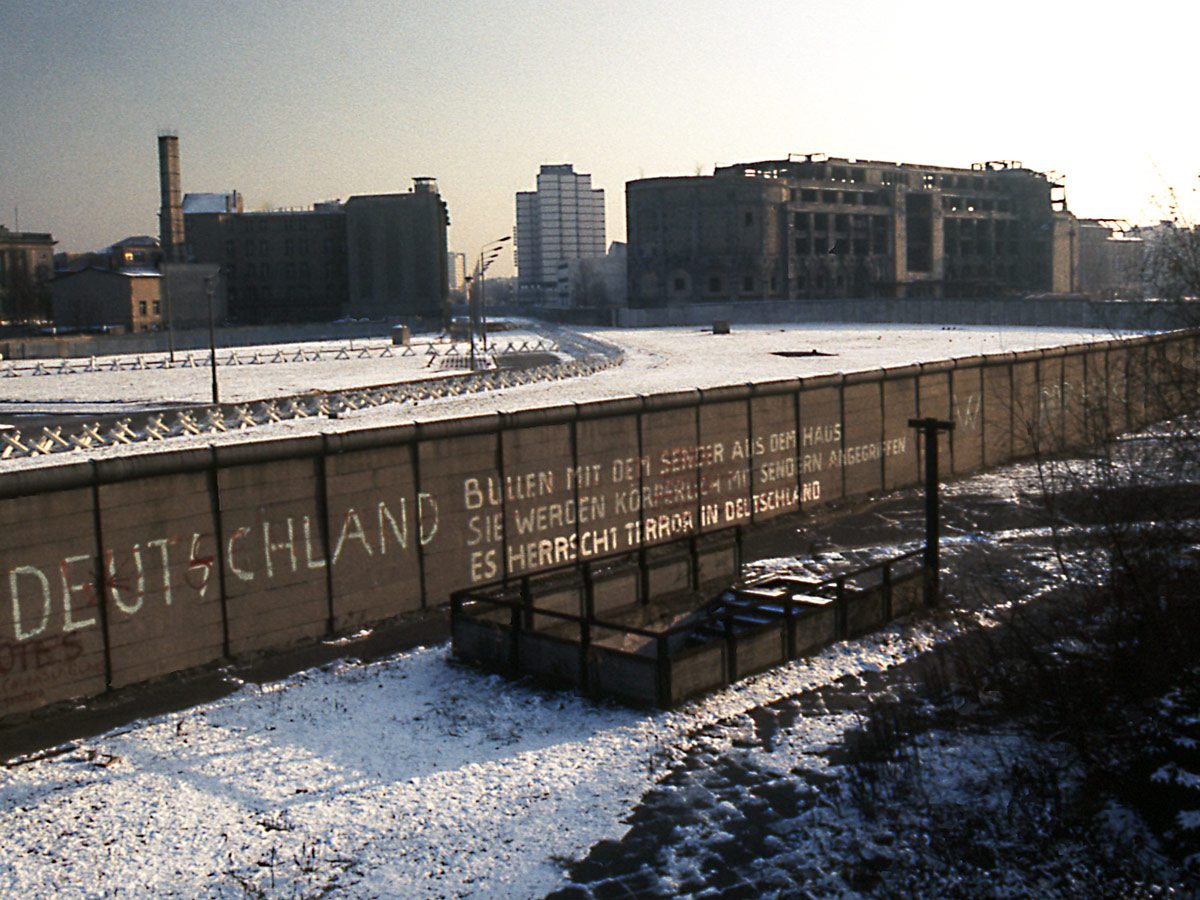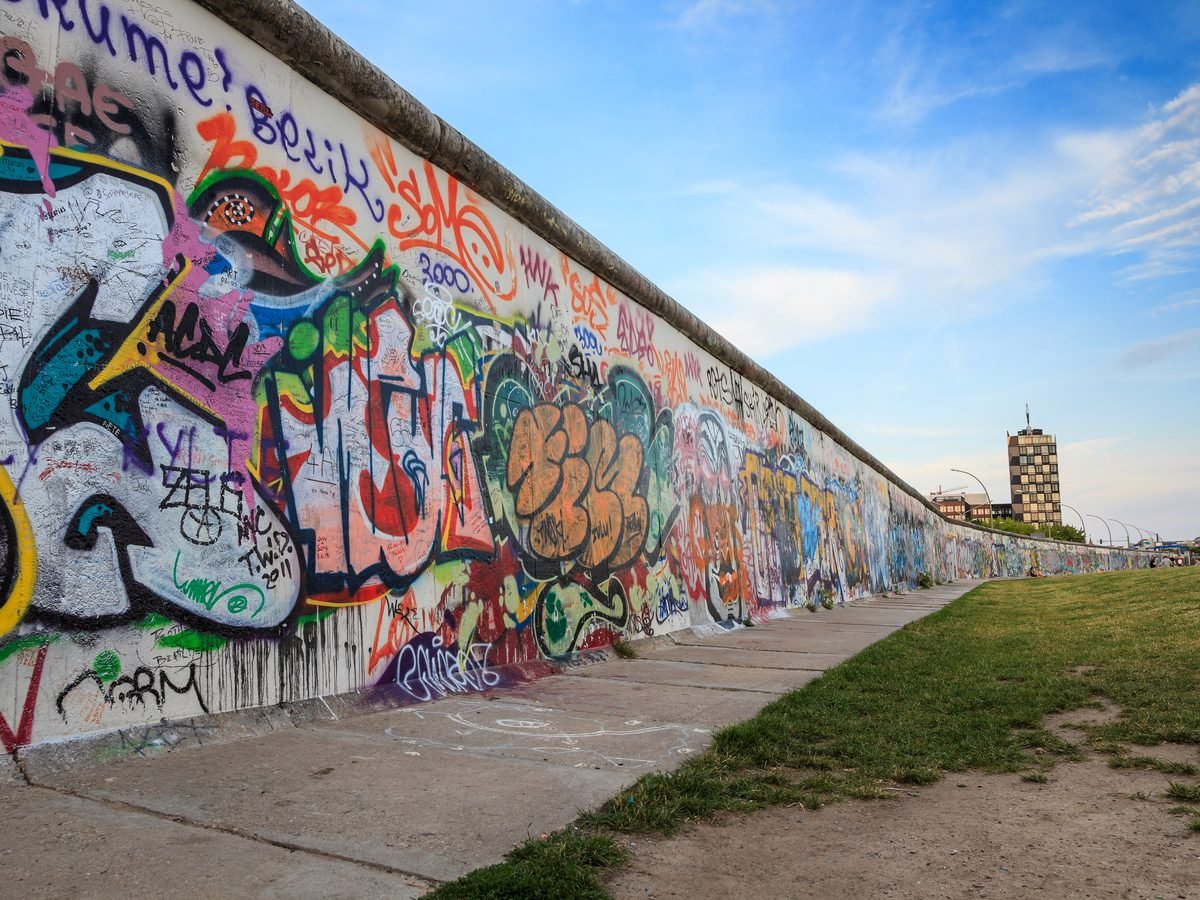
Into the West
The two ultralight aircraft buzzed through the dawn sky, following the Berlin Wall, just 250 metres below. Left of the floodlit “death strip” was the West, where the planes, little more than deck chairs attached to wings made of tubes and fabric, had taken off just a few minutes before. To the right of the Wall was the East, the danger zone they intended to enter.
At the controls of the leading plane, Ingo Bethke was as tense as on his own escape from the German Democratic Republic (GDR), but he grinned with satisfaction. There was no sign of activity from border guards. Their rules prevented them from firing at aircraft without permission. To confuse border guards even more, big Soviet-style red stars were glued to the camouflage pattern of the 10-metre wings. Both pilots—Ingo and his brother Holger—wore army coats with red stars on their helmets.
“Hello, Eagle Two,” Ingo said to his brother by walkie-talkie. “I bet the phones down there are starting to ring!”
The third brother, Egbert, hid in bushes, waiting for them to land.
The three brothers grew up in southeast Berlin, as close and loyal friends. Loud and boisterous, they were always getting into scrapes. Their parents were both high-ranking police officers and hard-line communists.
Ingo, the eldest by a year, was seven when the Wall went up. His ambition was to see the world, but it could never happen as long as he was trapped in the East. Signing on for military service, he joined a regiment guarding the border along 80 kilometres of the Elbe River north of Berlin. He got to know the area and made his plan carefully, keeping it secret from his fellow soldiers.
In May 1975, now 21 and working as a street cleaner, Ingo managed to get a rental car for a weekend, after waiting four months. Telling nobody of his plan, he drove with a friend to the “green” border along the Elbe where he had patrolled. There was no wall, but the death strip was full of hazards. First there was a wide strip of carefully raked sand. Next was a strong metal fence capped with barbed wire and a tripwire that activated floodlights when touched. Behind that was a strip with mines. They managed to get through, and lying low at the water’s edge, they blew up air mattresses and silently paddled 150 metres to the other side.
A West German border police van was parked up the road. “It’s a cold night for swimming,” the officer told Ingo when he tapped on the window.
“Not when you’re swimming out of the East,” Ingo grinned.
The escape put a lot of pressure on the family left behind. Ingo’s parents lost their jobs. His youngest brother, Holger, was followed everywhere, but in March 1983, on the night of his 30th birthday, he made his move. He had one last drink and said an emotional goodbye to Egbert, the only person other than Ingo who knew of his plan.
For weeks, he and a friend had practised archery and made dry runs in the forest. Holger had spotted a street near Treptow Park where the death strip was narrow, with tall houses on either side. Now, he sneaked up to an attic and reached a small window in the roof.
With a powerful bow, he shot an arrow that flew 40 metres over the border and beyond the house opposite. It trailed a nylon line unravelling from a champagne bottle. With the nylon line, Ingo pulled a wire high across the border. Holger knotted his end around a chimney; Ingo tied his to the bumper of his car and drove a few metres to pull the rope taut. Now came the dangerous part: Holger had made a metal pulley enclosed in a frame with two hand holds attached and a strap to hold his wrist. He snapped it over the rope, gripped the handles and launched himself into space. With a soft whirring noise, he travelled high over the border and managed to reach the top-floor balcony of the house opposite. Now two brothers were in the West.
Ingo and Holger, who ran a pub in Cologne called Al Capone, racked their brains about how they could help their middle brother. Egbert was given a hard time by the Stasi. They even offered him a free ticket to the West, but he turned it down, knowing it was a test. “I like the GDR and I’m staying,” he said.
It was a picture of a baby helicopter in Playboy that caught Ingo’s eye. He went to see it at a fair in Hanover but it was only a prototype. By chance, however, he and Holger met two French pilots who told them about a tiny aircraft called the “ultralight.” They went to France to try one out. “This is it,” Ingo said. “Now we can pluck Egbert out of the East.”
The planes, with 10-metre wing-spans, lacked any protection for pilot and passengers—each one just a pair of seats side by side, with tiny wheels and a small engine. They could be taken apart and transported by trailer.
Preparations took four years. In May 1989 Ingo and Holger drove to Berlin and sent a coded message to Egbert: “Ulrike is doing well.” It was the signal for Egbert to be ready.

One final rescue mission
At midnight on May 25 the weather conditions looked fair. On a sports field in a park, Britzer Garten, the two ultralights were assembled. In case one crashed, they would try to get off the ground with all three of them in the other one. But Egbert and Ingo weren’t sure that would be possible.
Ingo checked that the control wires were the right way around. At 4:15 a.m. in East Berlin, Egbert took up position under the bushes in Treptow Park.
Minutes later, the two pilots turned their planes into the wind and started the engines. In five minutes the huge expanse of Treptow Park was in sight. Ingo descended while Holger circled above, ready to come down if Ingo got into trouble.
“Okay, land now,” Holger said.
Egbert ran out of his hiding place, sprinted to the plane as it turned and jumped into the empty seat. Ingo hadn’t seen him for 14 years, but there was no time to talk. There was a quick flash of recognition as they looked each other in the eyes. Ingo handed Egbert a helmet and gunned the engine.
With an extra man on board, the plane got to full speed slowly. It lifted off the ground and only just cleared the trees. Ingo turned towards the Wall again, following it north. In five minutes, on the west side of the Wall, he saw the distinctive bulk of the Reichstag looming ahead. The big lawn in front of it became their runway. The two little planes rumbled to a stop and the three brothers leaped out, shouting with joy. Waiting friends took them out for a beer.
“It was the best drink of my life,” says Egbert. “I thought I’d never see my brothers again, but they came out of the sky like angels and took me to paradise.”
Next, learn about the American couple that rescued 50 children from the Nazis.